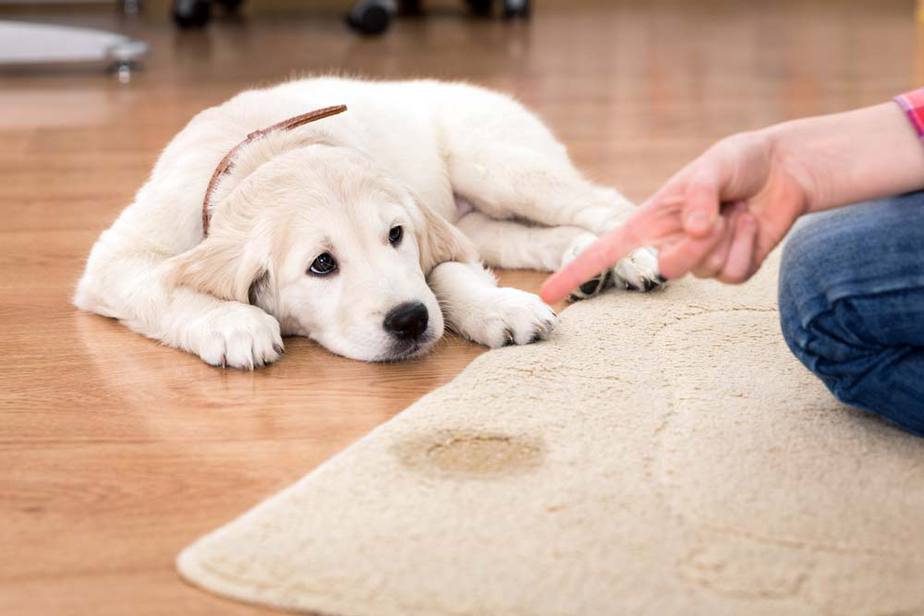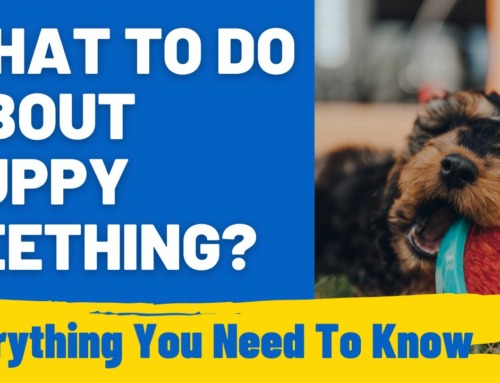Not only are new puppies adorable, but they’re a lot of work! Sometimes it seems like their little bladders just can’t keep anything inside. For the most part, this is totally normal, however sometimes there can be something going on that needs to be investigated.
How Often is “Normal” For a Puppy to Pee?
How often a Labrador puppy pees depends upon their size, age, and lifestyle. A healthy puppy should be able to hold their bladder for an hour for every month of their age, plus one. For example, a 2-month-old Lab puppy should be able to hold their pee for 3-hours.
Smaller dogs will need more frequent potty breaks than larger dogs, due to the difference in the size of their bladders. Puppies also obviously need more potty breaks than older dogs.
| Puppy’s Age | Avg. Time Puppy Can Hold Their Pee |
|---|---|
| 2 months | 3 hours |
| 3 months | 4 hours |
| 4 months | 5 hours |
| 5 months | 6 hours |
| 6 months | 7 hours |
| 7 months or older | 8+ hours |
While an adult dog might hold their bladder for 8-12 hours, a puppy can’t hold their bladder that long. For one, puppies do not have complete control over their bladder muscles until 4-6 months old. It’s very normal for occasional accidents to happen until at least 6 months of age.Your Labrador puppy may need even more frequent breaks if they’ve been drinking a lot of water or playing and running. There’s no exact rule when it comes to how long puppies can hold their bladder and the above table is only a rough guide.
A good way to track what is normal for your Lab puppy is to keep track of when they pee throughout the day, accidents or not. In addition, tracking the times your puppy eats, drinks, and plays can help you determine when they usually need a bathroom break. This type of monitoring can make potty training a breeze, as you can beat them to their house pee and take them outside.
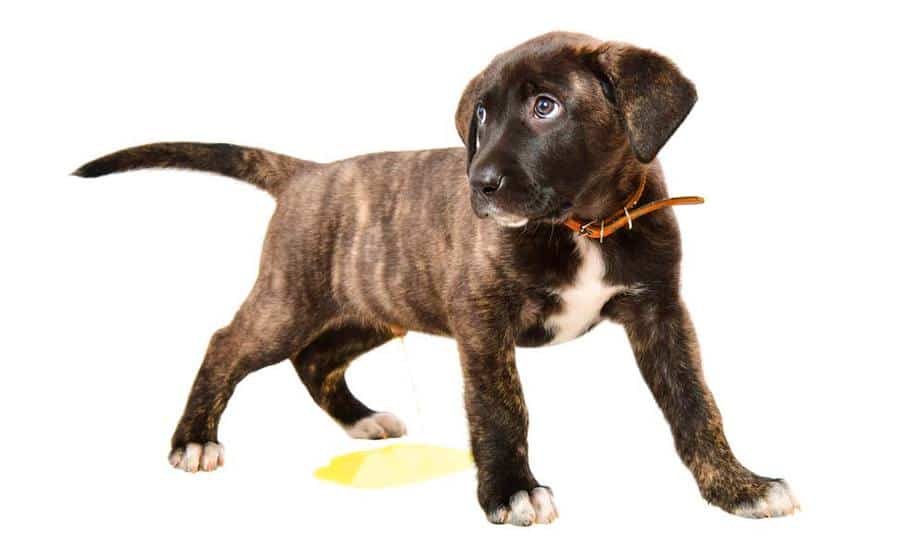
When Should a Labrador Puppy be Potty Trained?
Because puppies are still gaining the ability to control their bladder muscles until 4-6 months of age, it’s not reasonable to expect house training to be perfect before this point.
However, if you’ve been consistent with your potty training, you should have very few accidents by the time your Labrador puppy is 4-months old. By the time your Labrador Retriever puppy is 6 months old, they should have the ability to control their bladder.
If your Lab is having any accidental pees after 6-months old, especially if they haven’t had to go longer than 7-hours without a bathroom break, you need to consider why.
In some cases, it might show a gap in your training plan. If your puppy is having accidents in a place that is new to them, or where they smell that another dog has previously gone, you might have a training plan instead of a medical concern.
However, accidents after 6-months also warrant consideration for a medical reason. There are some medical problems, such as urinary tract infections (UTIs) that can cause your Labrador puppy to have accidents when they normally wouldn’t.
In general, if you struggle with potty training, you should contact both your puppy’s veterinarian as well as a dog trainer or behaviorist. Having a team of professionals on board can be the best way to solve problems before they have gone on too long.
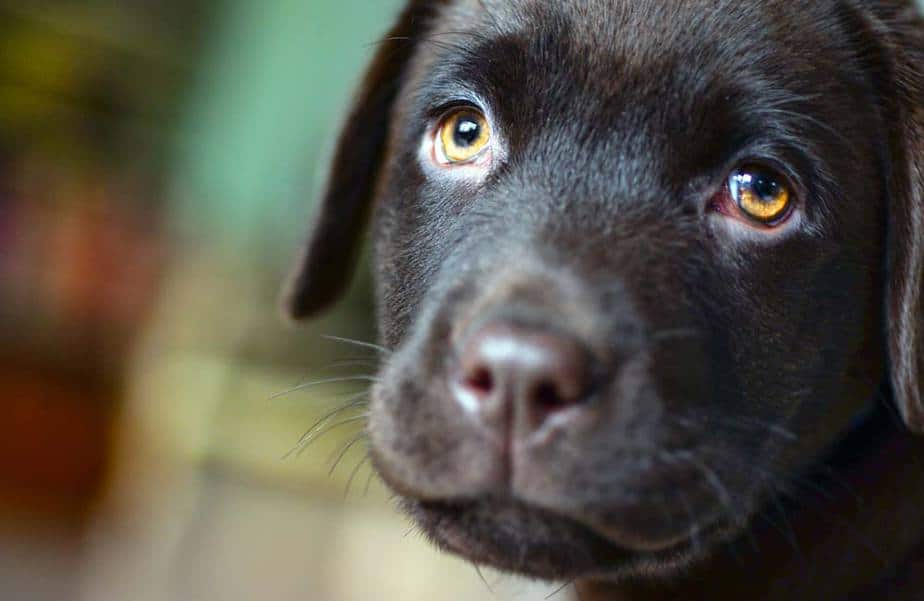
How to Get Your Lab Puppy to Stop Peeing in the House?
If your potty-training accidents are due to training, and not due to medical reasons, there are several things you can do to get your lab puppy to stop peeing in the house. The most important part of potty training, though, is consistency! No method of potty training will be effective if it isn’t used consistently with all members of the family.
When puppies cannot be trusted to not have accidents, it’s extremely important that they’re not left alone in places where they’re likely to pee inside. If you cannot watch your puppy, they should be in a kennel, crate, or other place where they are not likely to pee.
This means that when your puppy is out and about in your home, your attention needs to be devoted to your puppy. You can make this easier by utilizing baby gates or exercise pens to ensure your puppy stays in the room with you.
Another way to watch your puppy is to keep them on a leash and keep the leash with you. This will help make sure that your puppy doesn’t sneak off behind furniture and have an accident you aren’t aware of. As a bonus, your puppy is already on a leash and ready to go when you need to run them outside!
Punishing your puppy for having an accident inside is a terrible idea and will only cause anxiety, which can create a host of problems for you. Rather than teaching puppies what not to do, we need to teach them what we do want them to do. This show the way through love and praise will always ensure you have a beautiful dog without anxiety.
If you do punish your puppy by rubbing their nose in the accident or bringing them back to it and yelling at them, your puppy won’t learn the lesson you are intending to teach them. Instead, they will start to learn that when you see pee, you get upset. This can cause your puppy to hide when they pee, which will only make potty training increasingly difficult.
When you notice your puppy is about to go pee-pee, you should instead use a “positive interrupter” to buy yourself time to run your puppy outside. “Whoops!” is a good choice, because it doesn’t come out in a harsh manner that may inadvertently cause anxiety.
Besides giving the positive interrupter, you also need to quickly run your puppy outside. If you have a fenced-in yard, you can simply run the puppy outside without worrying about a leash.
Once your puppy goes outside, make sure to praise and reward them heavily! We want your Labrador puppy to learn that outside is exactly where they should be using the bathroom.
Finally, all accidents inside need to be cleaned with an enzymatic cleaner. Since dogs have such great noses, they can often still smell urine after it’s been cleaned using a regular floor cleaner. An enzymatic cleaner made specifically for dog urine will actually work to break down the components of urine.
Without breaking down the urine (and thus, breaking down the smell), your puppy is likely to still smell the area where they had peed before. Since puppies like to use the bathroom where they have in the past, this can create problems for your potty training.
We have more information on puppy’s peeing a lot in this post: Puppy Peeing a Lot: 5 minutes, 10 minutes, What is Normal?
Signs Your Labrador Puppy Has a UTI?
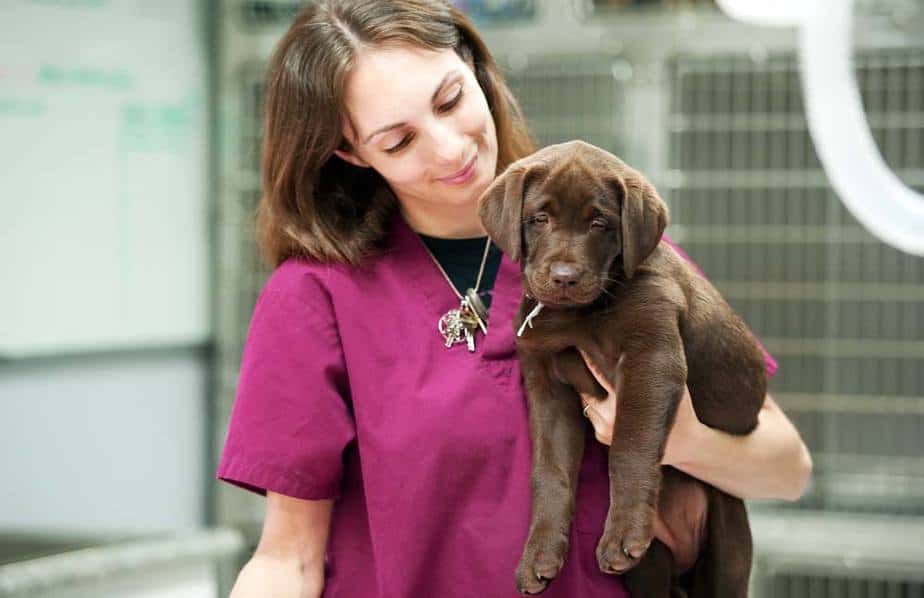
As we’ve stated previously, urinary tract infections can wreak havoc on even the best potty-training plan for puppies. This not-uncommon infection occurs when bacteria is introduced to the urinary tract, which can easily happen in puppies that are low to the ground.
There are other medical issues that can cause problems with potty training, too, including some structural issues that make it difficult for the dog to hold their bladder.
Trying to train a puppy who is dealing with the pain and discomfort of a urinary tract infection, without addressing the medical side of things, will become a futile task. Watch for these signs of a UTI:
- Change in urinary habits
- Drinking more than usual
- Dark or smelly urine
- Unable to hold their bladder more than usual
- Distress when urinating
If you see any of these signs your first stop should be a veterinarian.
Urinary tract infections can not only make it harder for your puppy to hold their bladder, but if it’s painful for them, they might associate the pain with the location of their bathroom breaks. It’s not uncommon to see dogs with severe UTIs start to pee inside instead of on grass in an attempt to see if peeing on the grass itself was the reason for their pain.
If you notice as you clean up your dog’s pee that it has an odd smell or is dark or bloody, those are additional symptoms that warrant a trip to the veterinarian.
Final Word
If you have any concerns about your puppy’s health, you should always start with a visit to the vet! Once you’ve ruled out any potential medical concerns, you’ll be able to move forward confidently with a training plan.

